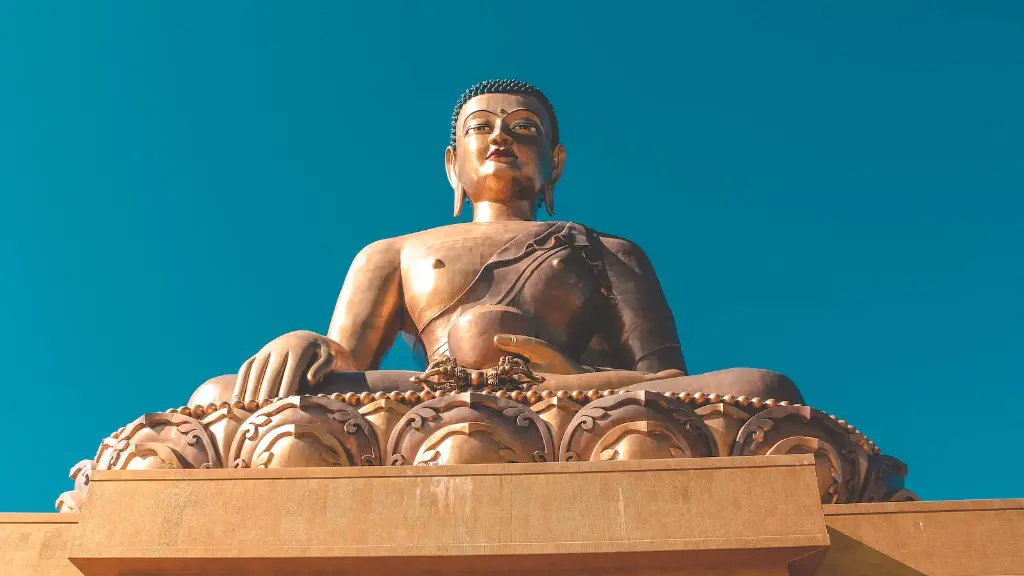Hinduism is one of the oldest religions in the world, with some records indicating it dates back over 4,000 years. It is widely considered to be the most influential faith in India and is widely practiced there, with observers estimating that over 80 percent of India’s population identify as Hindu. The religion has a broad scope, and encompasses many different beliefs, customs, and literature. Believers of Hinduism ascribe to different gods and have a belief system which revolves around the concept of karma and cycle of life.
One of the most fundamental beliefs of Hinduism is the acceptance of the idea of a divine force that is all-encompassing. Hindus do not uniquely worship one deity, but rather a pantheon of gods and goddesses, including Brahma, Vishnu, and Shiva. Hindus believe in reincarnation and find teachings in the stories of Hindu epics and legends.
The concept of dharma is also important in Hinduism. Dharma is the divine law of the universe and it is a very important part of the belief system of Hinduism. Dharma is believed to encompass all aspects of life, from physical health, to relationships, to morality. The karma and reincarnation concepts of Hinduism are rooted in the teachings of dharma.
The cycle of life and death, or samsara, is another belief of Hinduism. Hindu believers believe that souls pass through many different forms and bodies in order to reach moksha, or liberation from the cycle of death and rebirth. This process is believed to take many lifetimes and is governed by the concept of karma.
The religion also adheres to dharma shastra, or the indelible way, which outlines proper behavior, ethics, and actions that must be adhered to in order to reach moksha. Hinduism also encourages people to lead a life of balance, and make choices based on desire, wisdom, and action.
The philosophy of Vedanta, or the path to truth, is another important belief in Hinduism. Vedanta is a collection of ancient scriptures and teachings which are believed to provide the foundation for Hindu belief. Vedanta is a foundational text for seekers of truth and focuses on the inner spiritual journey to Self-realization.
Adi Shankara, an 8th-century Indian saint, was a major influencer of Vedanta. He is credited for codifying Hinduism as a religion, weaving it with concepts from Buddhism, Jainism and other Indian faiths. Adi Shankara’s teachings are still followed by many of today’s Hindus.
The Practice Of Bhakti In Hinduism
Bhakti is the practice of devotion and submission to a divine being. This practice is very important in Hinduism, as it honors the divine spirit in all aspects of life. Believers of Hinduism focus on the divine spirit as the source of their strength and invoke it through devotion and prayer. Devotional activities might include chanting spiritual prayers, singing devotional songs, fasting, and offering food to the gods.
Bhakti is thought to help Hindus find their personal path of connection to the divine spirit. It is practiced in many temples and other places of worship, and can be done as part of a group activity or in solitude. According to believers of Hinduism, bhakti is believed to bring one closer to the divine spirit and lead to inner peace.
The Purusharthas Of Hinduism
Purusharthas is a concept that is important in Hinduism and describes the four goals of life. These include dharma, the pursuit of righteousness; artha, the pursuit of economic stability; kama, the pursuit of pleasure; and moksha, the pursuit of salvation. Each of these goals is considered important in establishing a balance between a person’s physical, mental, and spiritual needs.
The purusharthas are often referred to as the four stages of life. Hindus believe that each person goes through these stages in life and that each is necessary for true fulfillment and harmony in life. Thus, by pursuing the four goals, or purusharthas, a person is thought to be able to find a balance between their spiritual, physical, and mental needs.
Karma In Hinduism
Karma is a core concept in Hinduism and deeply intertwined in the beliefs and practices of the faith. Karma is the belief that one’s deeds in this life will have an effect on their life and afterlife. Good deeds and thoughts can bring positive effects, while bad deeds and thoughts will have negative effects. Thus, karma is seen as a form of moral law that governs one’s fate and destiny.
Karma is a mechanism of cause and effect and is an important factor in Hinduism. Believers of Hinduism are expected to be conscious of their actions and motivations, and strive to live in harmony with the divine order. According to Hinduism, it is possible to control one’s karma through deliberate acts of service, devotion to the gods, and meditation.
The Caste System In Hinduism
The caste system is an ancient social structure which is still practiced in Hinduism today. It is based on a belief in the hierarchy of human social orders, with Brahmins (the priestly class) at the top, followed by Kshatriyas (warriors and rulers), Vaishyas (merchants and traders) and Shudras (laborers and servants). This caste system is seen as a spiritual order, in which individuals are born into and must adhere to.
The caste system has been widely criticized in recent years as it is seen as a form of discrimination. However, in Hinduism, it is seen as a form of spiritual and social order, and is thought to provide a structure that helps to keep society in harmony. It is believed that individuals are born into a caste due to their karma, and will be able to move up the ladder in future incarnations if they live positive and spiritual lives.
The Significance Of Ahimsa In Hinduism
Ahimsa is a concept that is central to Hinduism and a cornerstone of the faith’s belief system. It is the practice of non-violence, based on the belief that all living creatures have an inherent worth and deserve respect. This practice is derived from the wider concept of ahisma, which states that all beings should be treated with compassion and kindness. Ahimsa is seen as an important part of the belief in reincarnation, as one’s actions will have an impact on their future lives.
Ahimsa is seen as an important part of living an ethical and moral life. Hindus are expected to practice ahimsa in their actions and thoughts, and be conscious of the impact that their own actions can have on the lives of others. Ahimsa has inspired many social movements, such as non-violence and civil rights, and is still very relevant in today’s world.



